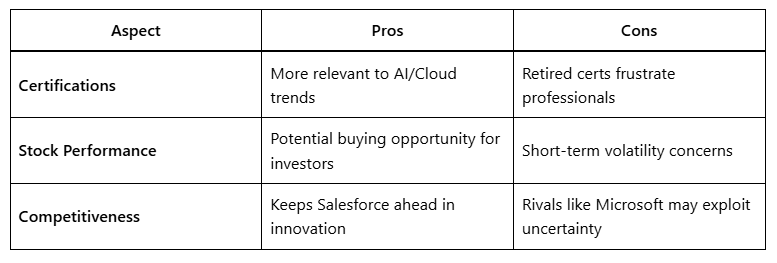Salesforce Certification Changes and Stock Drop in Summer ’25 Release

Introduction
Salesforce, the global leader in customer relationship management (CRM) software, has long been a dominant force in the tech industry. However, the Summer ’25 release brought significant changes that sent shockwaves through the Salesforce ecosystem, particularly around its certification program and a surprising stock price drop.
Table of Contents
This blog post explores:
- Key changes in Salesforce certifications and their implications for professionals.
- The unexpected stock decline following the Summer ’25 release.
- Industry reactions and what this means for Salesforce’s future.
By the end, you’ll have a comprehensive understanding of these developments and how they may impact Salesforce professionals, investors, and the broader tech landscape.
Part 1: Salesforce Certification Changes in Summer ’25
1.1 Overview of the Changes
Salesforce has historically updated its certification paths to align with evolving technology and industry demands. However, the Summer ’25 changes were more disruptive than usual, affecting multiple certification tracks, including:
1. Retirement of Legacy Certifications:
Several older certifications (e.g., Salesforce Certified Platform App Builder, some Consultant tracks) were discontinued.
2. New Role-Based Certifications:
Introduced specialized paths like AI Cloud Consultant and Revenue Cloud Architect to reflect emerging tech trends.
3. Increased Exam Rigor:
Many existing exams were updated with more scenario-based questions, raising the difficulty level.
4. Mandatory Continuing Education:
Some advanced certs now require annual re-certification or continuing education credits.
1.2 Why Did Salesforce Make These Changes?
Salesforce cited three key reasons:
1. Keeping Pace with AI & Automation
With the rapid adoption of Einstein AI and automation tools, certifications needed to reflect new skill requirements.
2. Reducing Certification Bloat
Streamlining the program to eliminate outdated credentials and reduce confusion.
3. Enforcing Continuous Learning
Ensuring certified professionals stay updated with the latest platform developments.
1.3 Impact on Salesforce Professionals
Pros:
- Better Alignment with Industry Needs: New certs like AI Cloud Consultant cater to high-demand skills.
- Higher Credibility: More rigorous exams could enhance the value of Salesforce certifications.
Cons:
- Cost & Time Burden: Additional recertification requirements increase expenses for professionals.
- Frustration Over Retired Certs: Many who invested in now-defunct certifications felt their efforts were devalued.
- Exam Difficulty Spike: Some test-takers reported failing updated exams despite prior experience.
1.4 How to Adapt?
For Salesforce professionals navigating these changes:
- Focus on Role-Based Certs: Prioritize credentials matching your career path (e.g., Developer, Architect, Consultant).
- Leverage Trailhead & Official Prep: Salesforce’s free learning platform (Trailhead) remains critical for exam prep.
- Join Study Groups: Online communities (e.g., Salesforce Stack Exchange, Focus on Force) help share insights on new exam formats.
Part 2: Salesforce Stock Drop Following Summer ’25 Release
2.1 What Happened?
Shortly after the Summer ’25 release, Salesforce’s stock (NYSE: CRM) experienced an unexpected 8-12% decline its sharpest drop in months. Analysts attributed this to several factors:
1. Certification Backlash:
Negative sentiment from professionals disrupted by certification changes led to concerns about ecosystem loyalty.
2. Slower-than-Expected AI Monetization:
Despite heavy investments in AI, revenue growth from Einstein AI tools fell short of projections.
3. Competitive Pressures:
Microsoft Dynamics 365 and HubSpot gained traction, raising doubts about Salesforce’s market dominance.
2.2 Investor Reactions
- Short-Term Sell-Off: Some institutional investors reduced holdings amid uncertainty.
- Long-Term Confidence Remains: Many analysts believe the dip is temporary, citing Salesforce’s strong recurring revenue and cloud expansion.
2.3 Salesforce’s Response
CEO Marc Benioff addressed concerns in an earnings call, emphasizing:
- Commitment to AI Leadership: Doubling down on AI-driven CRM enhancements.
- Ecosystem Stability: Reassuring partners and admins that certification changes will benefit long-term career growth.
Part 3: Industry Reactions & Future Outlook
3.1 Pros & Cons of the Summer ’25 Changes

3.2 What’s Next for Salesforce?
- AI & Automation Expansion: Expect deeper AI integrations across Sales, Service, and Marketing Clouds.
- Potential Certification Adjustments: Salesforce may tweak requirements based on feedback.
- Stock Recovery Likely: Historically, Salesforce rebounds after short-term dips due to strong fundamentals.
3.3 Advice for Stakeholders
- Professionals: Stay adaptable focus on in-demand skills like AI and data analytics.
- Investors: Monitor Q3 earnings for signs of recovery before making major moves.
- Businesses: Evaluate whether new Salesforce features justify increased licensing costs.
Conclusion: Salesforce Certification Changes and Stock Drop in Summer ’25 Release
The Summer ’25 release marked a pivotal moment for Salesforce, with certification changes reshaping career paths and a stock drop raising investor eyebrows. While the short-term impact has been rocky, Salesforce’s long-term strategy centered on AI and cloud innovation remains strong.
For professionals, this is a call to upskill strategically. For investors, it’s a reminder that even market leaders face turbulence. One thing is certain: Salesforce continues to evolve, and those who adapt will thrive in the new landscape.

